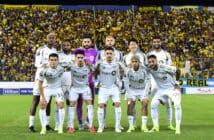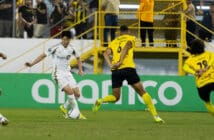
Players have appeared and disappeared from the side
Ali Gilmore
Does Klinsmann have answers to challenges like the ‘Changing of the Guard?’
by USMNT Correspondent, Robert Burns
Four trips around the oval.
That’s the gig for a miler, but in football terms, each lap represents one year in the cycle between World Cups – the ultimate finish line.
Now for most nations, breaking the tape at the end of the race leads to clear and obvious conclusions. For countries like Germany, Argentina, Costa Rica and Colombia, the numbers were most satisfying, while
the likes of Brazil, Italy and England were … well, let’s just say that ‘DNF’ would be a compliment.
However, for Juergen Klinsmann’s USA squad in Brazil last summer, the team’s official time was inconclusive at best. For many, the Americans exceeded expectations by navigating an impressive Group of Death and nearly ousting Belgium in the Round of 16’s final minute of regulation. For others, the U.S. played one solid game (which they drew with Portugal), and were clearly second best in all the others, despite snatching a late winner against Ghana in the opener.
Depending on which camp you belong to, the prospects for the years ahead are either rife with optimism, or awash in frustration. The depth of young talent (either homegrown or cherry-picked through passport diplomacy) coming up is more bountiful than any other time in U.S. soccer history, but for many others, scarred by unfulfilled promises of the first American international superstar, it’s all just hype, smoke and mirrors.
Why aren’t these wonderful prospects playing reasonable minutes of top-flight football with big clubs like Real Madrid’s Raphael Varane, or Bayern Munich’s David Alaba? Why can’t Juan Agudelo, once the USA’s ‘next big thing,’ find a club in over a year? Why aren’t more promising American kids looking past MLS to more proven and superior academies in Europe? And speaking of MLS, is its inferior level of play to our Euro counterparts really preparing them for the game at the highest level internationally for years to come?
And what of the Klinsmann revolution with the (not quite fully) established starting lineup? Where once there was the promise of sexy, dynamic attacking football, there now lies a reality of often Bradley-esque chessboard pragmatism and gutted out results.
But let’s be fair – everyone wants to be Germany, but few have the horses to do it.
It matters little what Klinsmann urges his team to do if the players themselves lack the ability to execute it.

Has Klinsmann abandoned flair for pragmatism
But don’t think for a minute that Klinsmann isn’t in large part responsible for many of the issues surrounding the team.
When a coach makes a decision like omitting his nation’s best-ever player ahead of a World Cup, it shows he’s confident with the idea of being scrutinized – and U.S. fans and media are more than happy to oblige.
They’ll ask intriguing questions like why the German World Cup winner can’t settle on a lineup or formation?
When does the experimentation give way to implementation? What’s with playing so many players out of their regular positions with their clubs? Did you know Arsenal fans still hate you?
Many questions. Few answers. That’s football.
But like it or not, the starting gun has been fired and the team’s early strides will be on display against Chile on Wednesday, albeit with a mixed squad of veterans, Olympic hopefuls and a few reclamation projects still hoping to prove their validity on the pitch.
In 2015, Klinsmann will once again challenge his players against the best competition available. After the upcoming tilt with the Chileans, the U.S. has dates ahead with daunting foes such as Switzerland, Mexico, Holland and the world champions – in Cologne no less. Win or lose, there’s no better preparation than that.
The U.S. can also look forward to having its big guns out this summer in stadiums across the country against the best CONCACAF has to offer – or at least Mexico’s B side depending on which squad shows up here or down south at the Copa America (Jamaica is also in the same boat).
This year’s Gold Cup is vitally important to the U.S. as defending its title won in 2013 would book its place at the 2017 Confederations Cup in Russia.
Should the team fall short of lifting the trophy once again, they’ll be forced into a playoff against the winner for that spot at Putin’s table. And make no mistake that many nations playing in this year’s version will be aiming to put on a good show with the dangling carrot of a potential spot in the 2016 Copa America Centenario at stake.
Speculation about where the team will be beyond that event is useless. And the main reason for that is most of the true excitement about the U.S. this year is not the post-World Cup doldrums period for the senior team until the Gold Cup, but instead the U-23s, U-20s and U17s. There are (potentially) two youth World Cups to look forward to – the U20s recently secured passage after a poor start in Jamaica, while the U17s face the same challenge to qualify next month in Honduras.

Players such as Jermaine Jones (above) and Clint Dempsey need to be replaced.
More importantly – and not just in terms of trying to erase the memory the 2012 Nightmare in Nashville – the U23 squad will seek to earn a spot in Rio next summer at the Olympic Qualifying Tournament. At that age group though, many of those players should be pushing for places with the senior squad. That’s the plan at least.
And it’s something that must happen.
The changing of the guard is an inescapable aspect of national teams, and a decent number of familiar veteran faces, including Clint Dempsey and Jermaine Jones, need to be challenged every step of the way by players who are hungrier, faster, stronger, and no longer willing to be denied their place on the team.
It sounds cutthroat, but it’s that type of competition for places that brings out the best performances from the best players on the best teams. Isn’t that what we’re all watching for?
The first turn has been rounded. The first bead of sweat has collected on the brow. Never forget that the race is long, but it’s fraught with peril. The competition is fierce and will do anything to leave you behind.
Right now it’s all about pace, measured breaths, and positioning. The finish line is Moscow.
Expectations And Hopes Rekindled As The US Men’s National Team Kick Off Their 2015 Campaign
![Prost International [PINT]](https://prostinternational.com/wp-content/uploads/2021/08/PINTtFontLogoRoboto1536x78.jpg)


